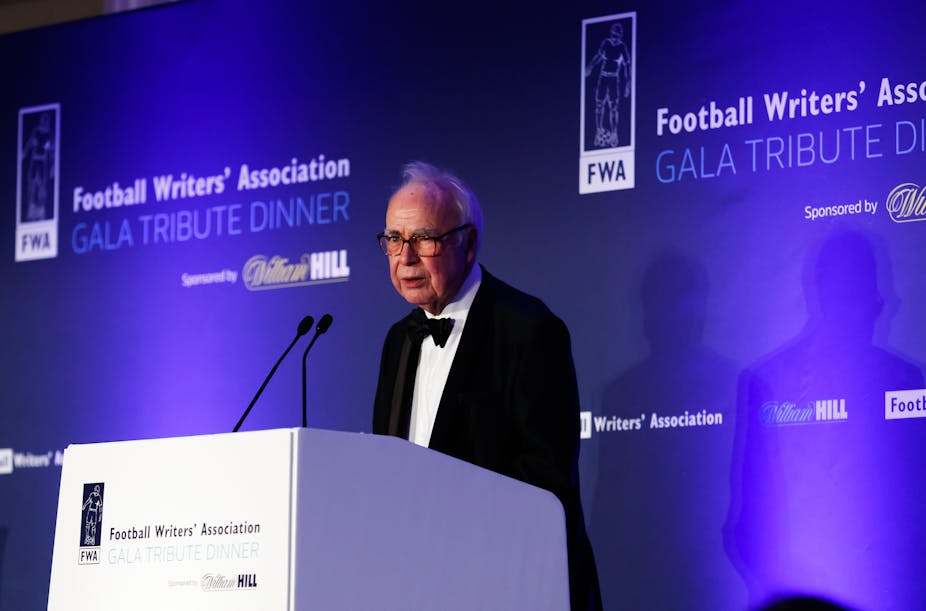Among all the tributes to the celebrated sports journalist Hugh McIlvanney, who has died aged 84, you will find one recurring theme: that in his work, the Scots-born reporter, writer and broadcaster transcended his genre. Greater by far than his renowned and extensive contact book, his insights based on a decades-long love of sport or his ability to get close to the sporting greats, was his ability – when writing about one sport or another – to impart some greater truth about the human condition.
In 1991, McIlvanney attempted to reflect on the role of the sports journalist in the documentary Sportswriter as part of the BBC’s Arena series. His opening narrative revealed some inner conflicts he himself felt on the role of the “fan with a typewriter”, a moniker often thrown at a very insular job. He said:
After more than 30 years of writing on sport it is still possible to be assailed by doubts about whether it really is a proper job for a grown person. But I console myself with the thought that it is easier to find a kind of truth in sport than it is, for example, in the activities covered by political or economic journalists. Sports truth may be simplistic but it’s not negligible.
In spite of the self-mocking concern about his chosen profession, McIlvanney’s point about “sports truth” is suggestive of the value of investigating sport. Not least to find some deeper meanings about people and society. Whether or not we believe there is a “truth” to be found, there is at the very least a sense that meaning and value can be found in sport which are unique to the human experience.
In all his writings on sport McIlvanney kept this sense of deeper “sports truth” at the heart of his reporting and commentary pieces. This was none more the case than in his writing on boxing, for which he carried a particular fascination throughout his career which included the rise of its most preeminent pugilist Muhammad Ali. “It gave me the time and freedom to seek him out in private settings and eavesdrop on his life”, he once wrote, “rather than having to settle for the public turn – that performance was wonderfully entertaining, but there was richer ore to be mined.”
That deeper knowledge and understanding and having the time to explore the richness of sporting personalities and their human foibles is the luxury contemporary sport journalists do not have. Access to sport stars is now heavily guarded, and unlike Ali, their suspicion of the media and the closeted world they live in often makes for sterile and replicated copy from journalists feeding off titbits.
Literary style
McIlvanney’s writing also stood out among his contemporaries because of his prose: inflected with literary references, rich in metaphor and simile, often self-reflective of the meaning that sport gave to him and the wider world. Take for example this excerpt from The Observer in 1974 following the famous “Rumble in the Jungle” where McIlvanney evokes Ali’s satisfaction of a job well done:
Lying back on the thick cushions of an armchair in his villa, with the windows curtained against an angry sun that was threatening to evaporate the Zaire River as it slid like a grassy ocean past his front door, he talked with the quiet contentment of a man whose thoughts were acting on him as comfortingly as the hands of a good masseur.
This is no ordinary sports writing. McIlvanney was no ordinary sports writer. His work was more akin to a mid-20th century tradition of literary commentators and critics than jobbing sports reporters. His contemporaries in sports writing were American – George Plimpton, Norman Mailer, AJ Leibling – with only a few in British sports journalism that came close, Ian Wooldridge perhaps. Sure, he had to travel and drink like the rest of the press pack that followed the teams and major events across the country and the globe. But he fashioned a position for himself in sport journalism, first at The Observer and then at the Sunday Times, that transcended mere reportage to more deep thinking on sport and sporting heroes.
He socialised with writers and critics beyond sport (his younger brother William was one of Scotland’s most celebrated novelists) which brought him in to wider literary circles and friendships. This arguably inspired his approach and thought processes in writing about sport. Perhaps because of it, he is the only sport journalist to be voted British Journalist of the Year.
There is much more that could be said about his writing, but for me some of his best work came in the medium of television, delivering his erudite words in a deep yet becalming Ayrshire voice.
His treatise on the influence of the west of Scotland coal-mining area on three legendary Scottish football managers Matt Busby, Jock Stein and Bill Shankly remains one of the greatest sport documentary series ever produced in the UK.
In his passing, one can only hope the BBC revive his documentaries from their vaults and allow us all to get lost in McIlvanney’s thoughts and interpretations which told us so much about the meaning of sport.

